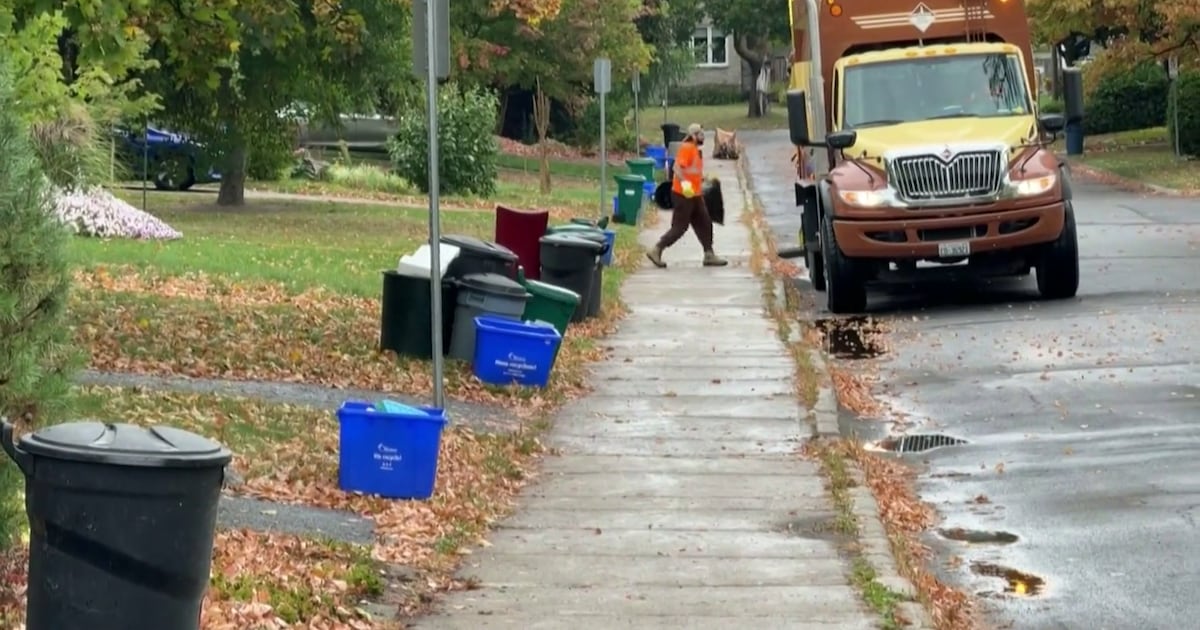Top Stories
Ottawa’s New Garbage Limit Cuts Waste But Leaves Items Curbside

The City of Ottawa’s new garbage regulations, which limit households to three items of waste every two weeks, have led to a significant decrease in landfill waste. As of September 30, 2024, residents are required to place any items exceeding the limit in yellow bags. The three-item restriction impacts approximately 310,000 households utilizing curbside waste collection.
Statistics indicate that Ottawa residents sent 102,882 tonnes of garbage to the Trail Road Landfill between October 2024 and September 2025. This marks a notable reduction from 125,682 tonnes during the previous year. According to a report prepared for the Environment and Climate Change Committee meeting on October 21, city staff described the initial year of implementing the garbage limit as “successful,” with residents generally adapting to the new policy.
Compliance and Tagging of Excess Waste
The city has also instituted a rule that garbage containers must not exceed 140 litres in capacity and must have a removable lid. The reduction in garbage tonnage from January to August 2025 compared to the same timeframe in 2024 is attributed in part to compliance with the new garbage limit. Staff stated, “It is important to note that other factors, such as reduced consumption patterns influenced by economic conditions, also contribute to changes in waste generation rates.”
Despite the positive trends, thousands of items have been tagged and left at the curb due to exceeding the three-item limit. Since the implementation of the new regulations, Solid Waste Services has issued approximately 67,500 tags for excess waste. The tagging system is designed to inform residents of compliance issues and encourage adherence to the new rules. In 2025, the tagging breakdown showed 16,300 tags were issued from January to March, 23,100 tags from April to June, and 13,500 tags from July to September.
Staff noted that the increase in excess waste tags during the second quarter was likely influenced by seasonal activities such as spring cleaning and student move-out periods. However, a decrease in tags during the third quarter is seen as a positive trend, indicating growing compliance as the policy approaches its second year.
Green Bin Program Expands in Multi-Residential Areas
In addition to the garbage limit, Ottawa has also witnessed an increase in the collection of organic waste from apartment and condominium buildings due to the expansion of the Green Bin program. As of September 30, 69 percent of multi-residential buildings receiving city services now participate in this program. The report revealed that 1,625 properties currently have access to Green Bins, with 345 properties added since the mandatory organic waste program began in October 2024.
Between January and July 2025, multi-residential buildings reported a collection of 1,396 tonnes of organic material, reflecting a 36 percent increase over the same period in 2024. Staff members assert that these initiatives, coupled with ongoing education and compliance tracking, are essential for enhancing waste reduction across the city.
As Ottawa continues to navigate its waste management challenges, city officials remain committed to monitoring compliance with the new regulations while promoting sustainable practices among residents. The ongoing evaluation of waste generation trends will guide future adjustments to the city’s Solid Waste Master Plan.
-

 Science3 months ago
Science3 months agoToyoake City Proposes Daily Two-Hour Smartphone Use Limit
-

 Health4 months ago
Health4 months agoB.C. Review Reveals Urgent Need for Rare-Disease Drug Reforms
-

 Top Stories4 months ago
Top Stories4 months agoPedestrian Fatally Injured in Esquimalt Collision on August 14
-

 Technology3 months ago
Technology3 months agoDark Adventure Game “Bye Sweet Carole” Set for October Release
-

 World3 months ago
World3 months agoJimmy Lai’s Defense Challenges Charges Under National Security Law
-

 Lifestyle4 months ago
Lifestyle4 months agoVictoria’s Pop-Up Shop Shines Light on B.C.’s Wolf Cull
-

 Technology3 months ago
Technology3 months agoKonami Revives Iconic Metal Gear Solid Delta Ahead of Release
-

 Technology3 months ago
Technology3 months agoApple Expands Self-Service Repair Program to Canada
-

 Technology3 months ago
Technology3 months agoSnapmaker U1 Color 3D Printer Redefines Speed and Sustainability
-

 Technology3 months ago
Technology3 months agoAION Folding Knife: Redefining EDC Design with Premium Materials
-

 Technology4 months ago
Technology4 months agoSolve Today’s Wordle Challenge: Hints and Answer for August 19
-

 Business4 months ago
Business4 months agoGordon Murray Automotive Unveils S1 LM and Le Mans GTR at Monterey









